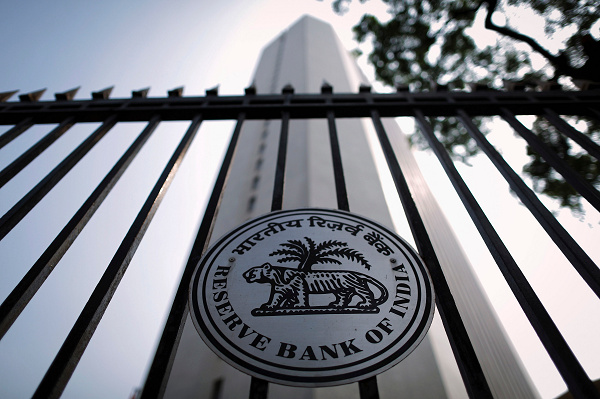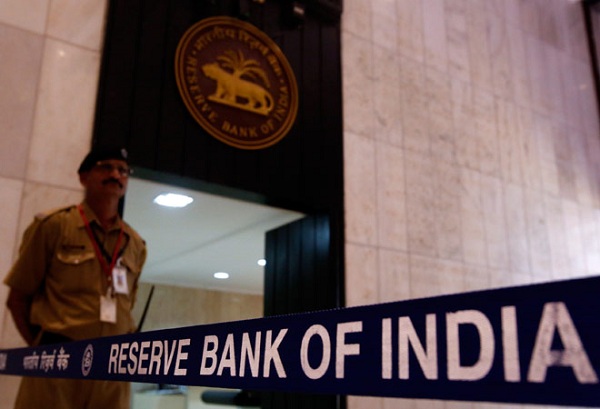
by admin | May 25, 2021 | Banking, News
 Mumbai, (IANS) The Reserve Bank of India (RBI) on Tuesday left its key policy rates and reserve ratios unchanged, concerned over the slight rise in inflation and some domestic and global upside risks that have sprung up since April.
Mumbai, (IANS) The Reserve Bank of India (RBI) on Tuesday left its key policy rates and reserve ratios unchanged, concerned over the slight rise in inflation and some domestic and global upside risks that have sprung up since April.
The decision was taken at the second bi-monthly policy review for the current fiscal by Reserve Bank of India (RBI) Governor Raghuram Rajan at its headruarters here. “The inflation surprise in the April reading makes the future trajectory of inflation somewhat more uncertain,” Rajan said.
In the first bi-monthly policy review on April 5, Rajan had cut by 25 basis points the repurchase rate, or the short-term lending rate for commercial banks on loans taken from the Reserve Bank — to 6.5 per cent from 6.75 per cent.
The reverse repurchase rate for sort-term borrowings was raised to 6 per cent from 5.75 per cent.

by admin | May 25, 2021 | Banking, News
 New Delhi (IANS) The process to form the proposed Monetary Policy Committee for the Reserve Bank of India (RBI) will be initiated after the notification of the Finance Bill as an act, an official said on Tuesday.
New Delhi (IANS) The process to form the proposed Monetary Policy Committee for the Reserve Bank of India (RBI) will be initiated after the notification of the Finance Bill as an act, an official said on Tuesday.
“Process to constitute Monetary Policy Committee will be initiated after passage of Finance Bill and its notification as an Act,” Economic Affairs Secretary Shaktikanta Das said in a tweet.
At the sidelines of an event earlier in the day, Das said that the members from Reserve Bank “are known… that is already mentioned in the act itself. You have RBI governor, deputy governor and executive director. Now from the government side three independent members are to be nominated”.
As per the amendments to the RBI Act through the Finance Bill passed in the Lok Sabha, the committee will have six members, with three appointed by the RBI and three government appointees nominated by an external selection committee. The RBI governor will have the casting vote in case of a tie.
From the RBI, the committee will consist of the governor, the deputy governor in charge of monetary policy and one official nominated by the central bank.
The members of the MPC appointed by a search committee will hold office for a period of four years and would not be eligible for re-appointment.
Under the current system, the RBI governor has the veto over the existing advisory committee, composed of RBI members and outside appointees, that decides on policy rates. The governor consults a Technical Advisory Committee, but does not necessarily go by the majority opinion while deciding on the monetary policy.

by admin | May 25, 2021 | Banking, News
 New Delhi, (IANS) The Reserve Bank of India on Thursday released the draft guidelines for ‘on tap’ licensing of universal banks in the private sector and sought comments on them.
New Delhi, (IANS) The Reserve Bank of India on Thursday released the draft guidelines for ‘on tap’ licensing of universal banks in the private sector and sought comments on them.
“The suggestions on the draft guidelines may be sent by June 30 this year. Final guidelines and inviting applications for setting up of new universal banks in the private sector will be initiated after receiving the feedback,” the RBI said in a statement.
The resident individuals and professionals having 10 years of experience in banking and finance are eligible to promote universal banks, according the draft guidelines.
Large industrial or business houses are excluded as eligible entities but permitted to invest in the banks to the extent of less than 10 percent, it said.
The initial minimum paid-up voting equity capital for a bank will be Rs.5 billion and thereafter, it should have a minimum net worth of Rs.5 billion at all times.
The aggregate foreign shareholding in the bank should be 74 percent, as per the existing foreign direct investment (FDI) policy.
The licensing window will be open on-tap, and the applications in the prescribed form along with requisite information could be submitted to the RBI at any point of time, it said.
The decision to issue an in-principle approval for setting up of a bank will be taken by the central bank and will be valid for 18 months.
Non-operative financial holding company (NOFHC) has now been made non-mandatory in case of promoters being individuals or standalone entities. Promoter must own at least 51 percent of the total paid-up equity capital of the NOFHC, it said.

by admin | May 25, 2021 | Corporate
 Mumbai:(IANS) The RBI said on Tuesday called for guidelines to curb central banks globally adopting unconventional monetary policies and seeking exchange rate or financial market interventions to restore growth which may have large adverse spillover effects on others, which then could resort to aggressive policies to gain even small positive domestic effects.
Mumbai:(IANS) The RBI said on Tuesday called for guidelines to curb central banks globally adopting unconventional monetary policies and seeking exchange rate or financial market interventions to restore growth which may have large adverse spillover effects on others, which then could resort to aggressive policies to gain even small positive domestic effects.
“Perhaps instead, countries could agree to guidelines for responsible behavior that would improve collective outcomes,” Reserve Bank of India Governor Raghuram Rajan and the bank’s specialist advisor Prachi Mishra jointly wrote in a series working paper titled “Rules of the Monetary Game.”
Otherwise consequently, the world may embark on a sub-optimal collective path, the duo said, ahead of the RBI’s first monetary policy for the next fiscal due next Tuesday.
“The bottom line is that simply because a policy is called monetary, unconventional or otherwise, it may not be beneficial on net for the world. That all monetary policies have external spillovers does not mean that they are all justified. What matters is the relative magnitude of demand creating versus demand switching effects, and the magnitude of other net financial sector spillovers, that is, the net spillovers,” the paper said.
“Easy monetary conditions in advanced economies can lead to capital inflows, exchange rate appreciation, rapid credit growth, and asset price bubbles in emerging markets (EMs). On the other hand, monetary normalisation, or a rise in interest rates in advanced economies can cause capital outflows and exchange rate depreciation in the EMs,” it added.
The paper warns that dangers from applying prevalent global economic models for policy purposes could perhaps be significant.
“For example, the choice of scenarios that are played up prominently in policy documents could be tinged by ideology,” it said and suggests that towards creating a new global model, countries should engage proceed with eminent academics, there should be international seminars and discussions on the subject, and the International Monetary Fund should be involved.
“There can be no more important issue to understand and discuss than the international spillovers of domestic policies. Such a discussion need not take place in an environment of finger pointing and defensiveness, but as an attempt to understand what can be reasonable, and not overly intrusive, rules of conduct,” it added.
In a commentary posted on the website of Project Syndicate last week, Rajan said that the world needs a new international agreement on the lines of Bretton Woods that created the current multilateral financial system, to prevent central banks from adopting policies that could hurt other economies.
He said that central banks in developed countries find various ways to justify their policies, without acknowledging that the exchange rate may be the primary channel of transmission.
He said the world is facing an increasingly dangerous situation and both advanced and emerging economies need to grow in order to manage domestic political tensions.
“If governments respond by enacting policies that divert growth from other countries, this ‘beggar my neighbour’ tactic will simply foster instability elsewhere. What we need, therefore, are new rules of the game,” he said.

by admin | May 25, 2021 | Business, Large Enterprise
 New Delhi : (IANS) The RBI efforts to deal with the state-run banks’ huge non-performing assets (NPAs) or distressed loans are steps in the right direction, International Monetary Fund (IMF) managing director Christine Lagarde said on Sunday.
New Delhi : (IANS) The RBI efforts to deal with the state-run banks’ huge non-performing assets (NPAs) or distressed loans are steps in the right direction, International Monetary Fund (IMF) managing director Christine Lagarde said on Sunday.
“The (move of) Reserve Bank of India governor (Dr Raghuram Rajan) addressing bank balance sheets is absolutely right,” she said at the Advancing Asia conference here, co-hosted by the union government and the IMF.
Lagarde said the Indian government was also moving to get a bankruptcy and insolvency law enacted to address the bad loans problem.
Addressing the conference earlier on Sunday, Finance Minister Arun Jaitley said the government hopes to enact the bankruptcy and solvency as well as the Goods and Services Tax bills in the second half of the budget session of parliament beginning April 20.
The NPAs of public sector banks (PSBs) have increased by close to Rs.1 lakh crore in the first nine months of the current fiscal, parliament was told earlier this week.
“The gross non-performing assets of the PSBs increased from 5.43 percent as of March 2015 to 7.30 percent as of December 2015,” Jaitley told the Rajya Sabha in a written reply.
In money terms, gross NPAs of state-run banks increased from Rs.2,67,065 crore in March 2015 to Rs.3,61,731 crore in December 2015, he said, which was an increase of Rs.94,666 crore over nine months of the current fiscal.
Meanwhile, Lagarde told reporters here on Sunday that the central American nation of Cuba has not yet made a request for IMF membership, and that such a request will be considered in accordance with the norms of the multilateral lending agency.
Cuba was one of the founding members of the IMF until it left the organisation in 1964, following crisis with the US.

 Mumbai, (IANS) The Reserve Bank of India (RBI) on Tuesday left its key policy rates and reserve ratios unchanged, concerned over the slight rise in inflation and some domestic and global upside risks that have sprung up since April.
Mumbai, (IANS) The Reserve Bank of India (RBI) on Tuesday left its key policy rates and reserve ratios unchanged, concerned over the slight rise in inflation and some domestic and global upside risks that have sprung up since April.


